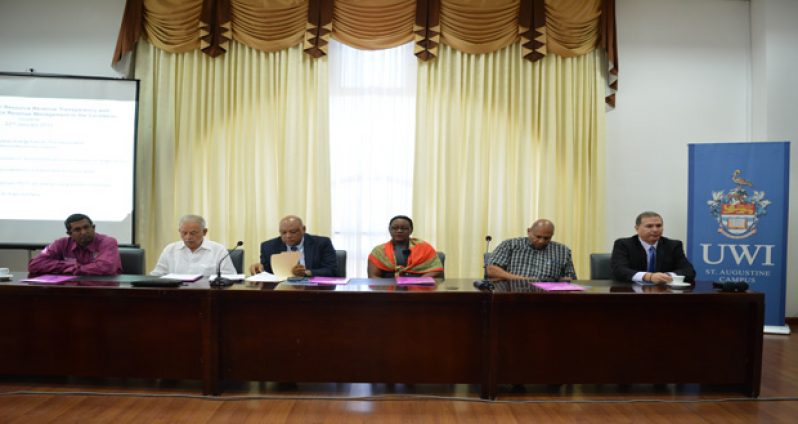WITH the hydrocarbon sector in Guyana on the verge of a major evolution, the country has been warned against the “Dutch Disease,” even as it is being called upon to establish a Sovereign Wealth Fund. Dr Roger Hosein – an economist attached to the University of the West Indies, St. Augustine Campus – sounded this warning on Friday during a seminar held by the Natural Resources Ministry in collaboration with the Extractive Industry Transparency Initiative (EITI) Secretariat (Norway), the Trinidad and Tobago EITI Office and the University of the West Indies.

Minister of Natural Resources, Raphael Trotman; Minister within the Ministry of Natural Resources, Simona Broomes; TT’s former Minister of Finance, Energy and National Security, Conrad Enill; TTEITI Chairman, Victor Hart; Head of the T&T EITI Secretariat, Sherwin Long and Dr. Francisco Paris of EITI International, were among the officials present.
Alluding to oil-rich countries such as Venezuela, Trinidad and Suriname that are now feeling the impact of the “Dutch Disease,” Dr. Hosein said Guyana should safeguard itself from such financial turbulence, although the economy currently is doing well.
The “Dutch Disease” is the negative impact on an economy of anything that gives rise to a sharp inflow of foreign currency, such as the discovery of large oil reserves. The currency inflows lead to currency appreciation, making the country’s other products less price-competitive on the export market.
Singling out Trinidad and Tobago, the economist said after living “lavishly” for approximately eight years, the country’s economy is now in a fragile state with its currency on the border line of devaluation, most likely linked to the drop in oil prices.
With Exxon Mobil Corporation announcing a significant oil discovery on the Stabroek Block – approximately 120 miles offshore Guyana, Dr. Hosein said it was important for the country to establish a Sovereign Wealth Fund to protect itself from a major financial collapse in the future. According to him, the financial resources that would be garnered from this developing sector should be placed into a Sovereign Wealth Fund also called a Stabilisation Fund.
INFRASTRUCTURAL DEVELOPMENT
“What the government at this point in time should do, is to ensure that it is creating the right infrastructural development network, so that money from this resource…is spent on infrastructure development either in physical capital or human capital development, so when the oil comes to an end, the Guyanese people could still be better off in terms of better infrastructural network and human capital network,” the economist explained.
He said too that the government should also consider the establishment of other industries that would attract investment for exports abroad.
“So some of the resources from this energy sector could be used to develop other export products linking with the diaspora, for which we know the Guyanese have a large diaspora abroad.
But despite the challenges, UWI’s Rebecca Gookool said, “Several extractive industry-based economies in the Region have benefited significantly over the period 2002 to 2014 from what has become known as a commodity super cycle.”
She said for many years Guyana had been looked upon with great interest by investors, as there were significant commercial hydrocarbon discoveries in countries close to Guyana, including Trinidad and Tobago, Suriname and Venezuela.
Though exploration for hydrocarbons in Guyana was largely unsuccessful in 2015, hope was regained with the discovery made by ExxonMobil.

“In terms of actual resource estimates, one source places the amount of hydrocarbons in the Guyana – Suriname basin at around 12 billion barrels of oil and possibly 42bcf of natural gas (US Geological Survey 2015).”
“Indeed, the Government of Guyana is now at the doorstep of commercialising what has been regarded as one of the largest oil finds in the world,” the UWI Research Associate added.
HAS TO PREPARE
However, she said the economy has to prepare itself for a macroeconomic shock, noting that policy-makers in Guyana must now navigate its development path under more uncertain economic conditions.
Against this backdrop, Gookool said the forum, themed: “Promoting Natural Resource Revenue Transparency and Sustainable Resource Revenue Management in the Caribbean,” was held to discuss the relevance and efficiency of increasing transparency mechanisms in the extractive industries that exist in Guyana.
“This transparency agenda under the purview of the EITI is a robust one, allowing for the inclusion of any type of extractive industry; from those which are renewable in nature such as the forestry or fisheries, to those sectors which are non-renewable, including hydrocarbons such as oil and gas and minerals such as gold and diamonds. The principles of the EITI are profound and impactful, resulting in a global shift in the way that sectors operate, the way companies invest and the way investment funds flow from between economies. These principles are simple in their conceptualisation, but have proved to result in much alignment requirements for economies which have so participated,” she explained.
By Svetlana Marshall



.jpg)









